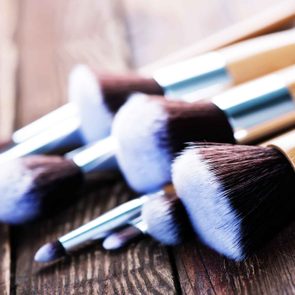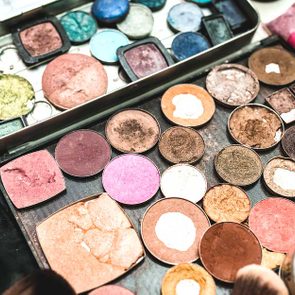 JGI/Jamie Grill/Getty Images
JGI/Jamie Grill/Getty Images
Why to clean your makeup brushes
Skincare’s always been a favorite consumer category, but arguably, the pandemic inspired all of us to step up our hygiene game. Still, says Susan Bard, MD, dermatologist at Manhattan Dermatology Specialists and a clinical instructor at the Mount Sinai Medical Center in New York City, there’s a particular face care practice too few of us have chosen to adopt: Cleaning our makeup applicators. Dr. Bard calls this “one of the biggest culprits causing skin infection or illness” and says worst of all, “people never clean them as often as they should.”
Guilty? You’re not alone, but here’s why it matters: Old makeup, oils, and dead skin build up in the bristles, creating the warm, moist environment that germs love. Plus, the skin is naturally composed of millions of microorganisms—bacteria, fungi, and even small mites—that we refer to as the microbiome, which plays a significant role in immunity and inflammation. “The skin’s microbiome is unique from person to person and depends on oil gland density, moisture, temperature, genetics, and environment,” explains Jessica Asgarpour, MD, FRCPC, FAAD, BSc, a Canadian and American board-certified dermatologist.
It’s not uncommon for an imbalance to occur within this microbiome, triggering the skin’s own bacterial overgrowth. “Using dirty brushes or sharing brushes may introduce new bacteria on the face,” Dr. Asgarpour says, adding that the overgrowth of microorganisms on makeup and makeup brushes has the potential to lead to infections of the skin and eyes.
What the data say about our makeup applicator habits
One study of cosmetic brushes noted the rate of bacterial contamination to be higher than fungus or yeast. In a 2015 online survey conducted by Harris Poll on behalf of Anisa International (a global company that develops beauty tools and solutions), researchers asked 1,113 women about their makeup habits. Over half of respondents reported they regularly used makeup brushes.
However—nearly two in three respondents confessed that they clean their brushes anywhere between “less than once a month” and “never.”
Most makeup products and tools, including sponges and brushes, are contaminated with potentially life-threatening superbugs, according to a 2019 study published in the Journal of Applied Microbiology.
Around 80% to 90% of the items tested were positive for Staphylococcus aureus (staph), Citrobacter freundii, or Escherichia coli (E. coli)—bacteria that can cause dangerous infections in healthy people and may be life-threatening for those who have compromised immune systems.
Makeup tools can also harbor impetigo, ringworm, and other contagious bugs.
Dirty makeup brushes also put you at a higher risk of less serious (but still annoying) skin conditions like acne, clogged pores, rashes, pinkeye, and overall irritation and redness, Dr. Bard adds.
“People should definitely be cleansing any tool they take to their face,” she says. This includes not just makeup brushes but also sponges, acne extraction tools, electric cleansing brushes, razors, and anything else you regularly use on your skin, she says. “When bristles on a brush begin to fray and show signs of wear, it is time to discard,” Dr. Asgarpour says.
How often to clean makeup brushes
To start, how frequently should we be cleaning our makeup application tools?
Dr. Asgarpour recommends washing your brushes every seven to 10 days, and throwing out expired products. Another clear sign she says it’s time to wash your makeup brushes: “When bristles on a brush begin to fray and show signs of wear, it is time to discard it.”
It might hurt to think about parting from that eyeshadow you’ve received compliments on since your twenties—but think about it: After you use a brush to apply a product on your skin and then dip the brush back into the bottle or palette—or every time you touch the liquid foundation dropper onto your face to get every last squeeze and then insert it back into the bottle—bacteria populate and reproduce inside your products. Even clean brushes get recontaminated.
How to clean makeup brushes
 JGI/Jamie Grill/Getty Images
JGI/Jamie Grill/Getty Images
Dr. Agaspour says: “Cleaning your makeup brushes is similar to washing your hair, using lukewarm water and a gentle shampoo. Use a glass jar to mix the water and shampoo and swirl the brushes inside the jar until they are clean, then leave on a towel to dry.”
Cleaning expert Joseph Marini of At Home with Joseph offers another method for makeup brush cleaning in a few easy steps:
Consider your cleaning product
Before you start, consider what you’ll wash your makeup brushes with—hint: It isn’t your antibacterial hand soap. “Makeup brushes, whether natural hair or synthetic, shouldn’t be cleaned with any chemical product that could cause dermatological issues,” Marini says. Marini likes pure olive oil soap such as this one from Greece, but you could also use Dr. Bronner’s Pure Castile Soap—just be sure to dilute it.
Be Gentle
Wash your hands with your gentle soap of choice and create a lather. If you’re cleaning your brushes regularly, you shouldn’t need a ton of soap. “Gently run the tip of your makeup brush in the palm of your hand in a circular motion to create a thick lather on the bottom half of the bristles,” Marini says, noting that we should be careful not to damage the hair of the brush by scrubbing too hard.
Rinse and Repeat
You’ll have better results and be gentler on your makeup brushes if you’re patient. “Gently rinse the tip of the brush under hot water and repeat the process until all traces of makeup are gone,” Marini says.
Shape and Dry
After the water runs clear, reshape the clean brush and allow it to air dry by hanging it upside down from a towel bar. “Placing them near a cool, gentle fan can help to dry them quicker,” Marini says, “but never dry them near heat or in direct sunlight.”
Best products to clean makeup brushes
Cleaning your makeup brushes doesn’t have to be complicated but it can be time-consuming. Luckily, there are some products that can help make the process a little easier, smoother, and simpler.
Here are some of the best products to use to clean and disinfect your brushes.
 via merchant
via merchant
RICRIS Premium Makeup Brush Cleaner and Dryer
31.9931% OFF$21.99 at Amazon
This automatic brush cleaner from RICRIS will wash your brush then spin it dry, all in under one minute. There are many different good options but this model has thousands of rave reviews from professionals and makeup newbies alike. Plus, it has eight collars included to hold all makeup brush sizes in your beauty arsenal.
 via merchant
via merchant
Norate Brush Cleaning Mat
Shop Now
It can be tough getting all the gunk out with your fingers, so rub your brushes against this Norate textured silicone mat. It suction cups right to the bottom of your sink and lets you deep clean in seconds. This brush cleaning mat also contains four different textures to clean various makeup brushes, including facial and eye brushes.
 via merchant
via merchant
Ecotools Makeup Brush Shampoo
$6.96 at Amazon
Ecotools makeup brush shampoo is a gentle alternative to regular soap, designed specifically to clean makeup while not damaging fragile bristles. The company recommends weekly use with a gentle massage or a brush cleaning mat.
 via merchant
via merchant
Bird & Fish Silicone Drying Mat
$8.98 at Amazon
Once you’ve gone to all the work of cleaning your brushes, you don’t want to put them down on a dirty surface to dry. This N/P Bird & Fish silicone drying rack for brushes allows you to store them upright for faster and more hygienic drying.
The makeup cleaning pad comes with four textures for deep cleaning, and to accommodate different brush sizes.
 via merchant
via merchant
HoMedics Portable UV Light Sanitizer
Shop Now
Ultraviolet rays can kill a wide range of germs, no water or soap required. After washing and drying your brushes, pop them in this HoMedics box to sterilize them.
This brand uses ultraviolet-C light LED technology to kill 99.9% of bacteria and viruses at the DNA level, according to the manufacturer.
 via merchant
via merchant
Watpot Acrylic Makeup Brush Holder
9.4926% OFF$6.99 at Amazon
Keep your clean brushes off dirty counters and display them where you can see them easily with this simple brush organizer from Watpot. It has three open slots that can be used to store makeup brushes and other beauty tools, like eyelash brushes, lipsticks, and more.
Additional writing and reporting by Jaime Stathis.





























